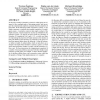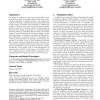1923 search results - page 245 / 385 » Modeling Complexity in Secure Distributed Computing |
113
click to vote
ATAL
2007
Springer
15 years 8 months ago
2007
Springer
We develop a model of normative systems in which agents are assumed to have multiple goals of increasing priority, and investigate the computational complexity and game theoretic ...
122
click to vote
DIALM
2010
ACM
15 years 9 days ago
2010
ACM
We present a method for using real world mobility traces to identify tractable theoretical models for the study of distributed algorithms in mobile networks. We validate the metho...
101
click to vote
JAIR
2010
15 years 23 days ago
2010
Coalitional games serve the purpose of modeling payoff distribution problems in scenarios where agents can collaborate by forming coalitions in order to obtain higher worths than...
133
Voted
CVPR
2007
IEEE
16 years 4 months ago
2007
IEEE
In this paper, we focus on the design of Markov Chain Monte Carlo techniques in a statistical registration framework based on finite element basis (FE). Due to the use of FE basis...
129
Voted
PODC
2010
ACM
15 years 2 months ago
2010
ACM
Mutual exclusion is used to coordinate access to shared resources by concurrent processes. k-Exclusion is a variant of mutual exclusion in which up to k processes can simultaneous...


